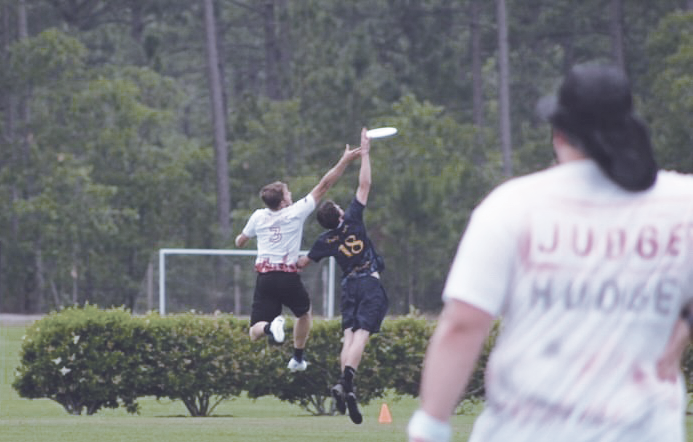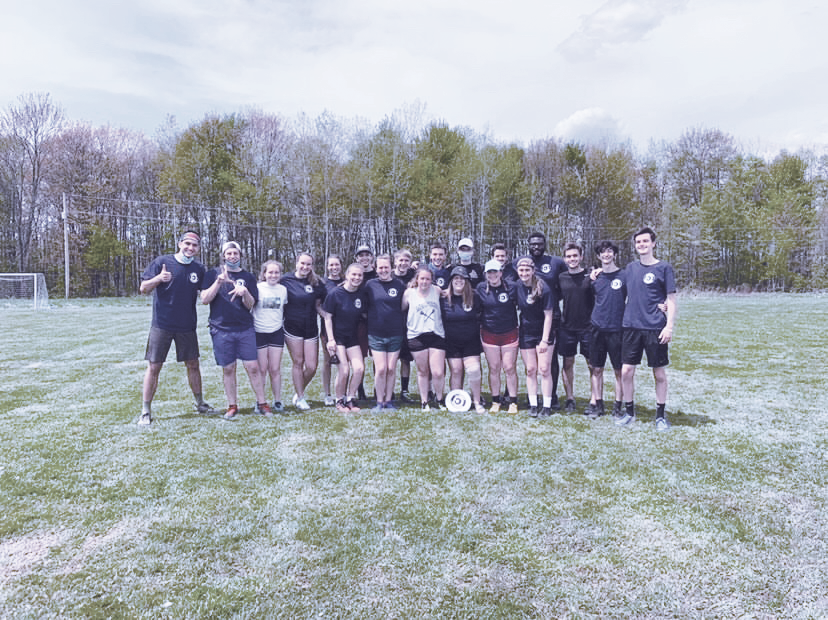Hellbenders welcome fun, sportsmanship and the disc
There’s no shortage of ways to get involved at Allegheny; a multitude of clubs, organizations and sports teams exist on campus, but some are more well known than others. For example, Allegheny’s Ultimate Frisbee — or “Ultimate” — team, the Hellbenders, is relatively elusive despite being as active as any other organization.
“(Ultimate is) an accessible sport to people,” said Men’s Captain, and Mixed co-Captain Owen Jacobsen, ’23.
This sentiment was echoed by the women’s captain and mixed co-captain Paige Genewick, ’22. The accessibility of the sport seems to be tied to the closeness and trust among the team members, since — according to both captains — Ul
timate fosters a culture of fellowship and mutual support with everyone being in a position to learn from and help one another. With the opportunity to learn from anyone on the team at any point, the sport has a very low barrier of entry, which both captains cite as one of the team’s draws.
The Hellbenders take their name from Allegheny’s original mascot, before it was decided that the alligator fit better for the school. The team attributed their relatively quiet presence on campus to the newness of the sport of Ultimate Frisbee itself, especially in comparison to other more established sports such as basketball or football.
The goal of each game is to get the disc or frisbee into the endzone in order to score a point, with the first team to 15 points being the winner. The disc cannot be carried, only passed. According to Genewick, Ultimate can be thought of as a sport not unlike a combination of soccer, football and early basketball.
The Ultimate team is different from other sports in that it can be split into three sorts of sections within the organization itself: the men’s team, the women’s team (Hellbenderitas) and the mixed team, which is comprised of members from both teams.
The sport’s unique schedules also contribute to its ease of accessibility. Unlike other sports, the Hellbenders only have three to four practices a week; the men’s and women’s team each practice twice a week, the mixed team practices once a week and both try to also have conditioning once a week. Similarly, the main season for the Hellbenders is during the spring and is focused on tournaments, with only about three each season. The consensus among the captains is that while the team is always looking for committed players, the actual level of commitment is not so high as to be discouraging.
With the pandemic affecting every part of life in the past 18 months, the Hellbenders were no different; both captains commented on how the pandemic made tournaments impossible and how practice was severely impacted as well, in the same way that that other clubs and sports were, in terms of social distancing and masking. While these policies were good for the health and wellbeing of the community, they were bad for the cultivation of the Ultimate team.
“It wasn’t the same,” Jacobsen said. “It wasn’t the sport that the people on the team had grown to love, so for that reason I think there was less interest in playing last year.”
The pandemic ultimately affected the team by diminishing their ability to recruit due to the cancelling or minimization of various recruiting opportunities like the Involvement Fair.
“It was definitely hard getting new people for both of the teams because I feel like the environment was like ‘be super cautious, stay super safe, don’t go near people that you wouldn’t normally associate with,’” Genewick said, referencing what she sees as a reason that the Ultimate team was lacking slightly in participation last year. “We’re gonna try to be a lot better with recruiting (this year). Not having the Involvement Fair was really hard.”
The team, however, hopes to bounce back from that this year.
“It’s definitely a mission of mine to grow the team, to grow campus awareness of the team, so that we can be better,” Jacobsen said.
The biggest draws for the Hellbenders’ Ultimate team, according to members, would seem to be the connections and culture of Ultimate. Angelina Cottril, ’24, described the culture as a robust sense of sportsmanship.
“Ultimate as a whole is a really welcoming community,” Cottril said. Cottril went on to comment on how the whole of Ultimate believes in an idea of “being spirited,” in terms of not only sportsmanship but also the
Genewick shared a similar belief, explaining that the team must have a shared trust between their own teammates as well as their opponents facilitated by the very nature of the sport. Ultimate matches have no referees, so any and all discrepancies during play must be settled properly and professionally between the teams. This seems to be the core of Ultimate here at Allegheny, and also apparently elsewhere: the ethos of personality, culture of compassion and commitment to the sport and one another.
“Since day one of playing on Allegheny Ultimate I’ve felt accepted, and it feels like you’re on a team; you’re not on your own,” Jacobsen said. “I think people care, that’s the bottom line.”

Mo is a sophomore from Columbus, Ohio. He is majoring in English and possibly minoring in JPI and/or Political Science. He is the Features Editor and this...













